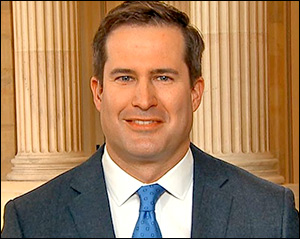By Jim Ellis

Massachusetts Rep. Seth Moulton (D-Salem)
Rep. Moulton, a decorated military veteran with four combat tours in Iraq and Afghanistan in addition to leading a group of insurgents to prevent Nancy Pelosi from returning to the House speakership, would make an attractive general election candidate. But he will have a difficult time convincing his own party’s activists, who will dominate the elected delegate membership, to support his presidential effort.
This would not be the first political race for Moulton that featured long odds, however. In 2014, he denied nine-term US Rep. John Tierney (D-Salem) re-nomination in the Democratic primary. Rep. Moulton has averaged 63.7 percent of the vote in his three congressional general elections. While not having to risk his seat to run for president, the congressman will likely face serious Democratic primary opposition should he eventually choose to seek re-election.
Polls
Gravis Marketing tested the Iowa Democratic electorate, and the University of New Hampshire did the same for the Granite State Democratic voting base to develop new results in both states. Interestingly, the top three finishers are the same in both surveys.
According to Gravis (April 17-18; 590 likely Iowa Democratic Caucus participants), Sen. Bernie Sanders (I-VT) clips former Vice President Joe Biden, though both record in the 19-percentile support range. South Bend (IN) Mayor Pete Buttigieg is a close third with 14 percent.
The University of New Hampshire (April 10-18; 241 likely Democratic primary voters) sees a similar order, but neighboring Sen. Sanders in his Green Mountain State has a sound lead over Biden at 30-18 percent. Here again, however, Mayor Buttigieg posts a strong third place finish, this time with 15 percent.
In both instances, we clearly see Buttigieg poaching much of the voting segment that originally was thought headed to former Texas Rep. Beto O’Rourke. In Iowa, O’Rourke drops to five percent support. He fares even worse in New Hampshire, falling to three percent preference.
The Buttigieg rise also seems to be having an effect on California Sen. Kamala Harris. Like O’Rourke, she is falling as Buttigieg rises. In Iowa, she drops to six percent and four percent in New Hampshire, though she never displayed early strength in either place.
Massachusetts Sen. Elizabeth Warren continues to perform badly. In fact, her showing in neighboring New Hampshire is slightly worse than her six percent in Iowa. Her Granite State preference factor is only four percent.
The UNH polling unit was not previously highly regarded, but that appears to be changing. The 538 statistical operation rates them a straight “B”, but their small 241-person Democratic sample on this particular poll does leave something to be desired. The Democratic National Committee has included UNH as one of the pollsters from which they will rate their presidential contenders for debate qualification, so their numbers are important.
UNH did ask an interesting question on this latest poll. At the end of the questionnaire the pollsters asked the respondent to say who they would “never” support. Underscoring her poor early performance, it is Sen. Warren who was the top response to this question. A full 14 percent of New Hampshire Democrats surveyed said they would “never” vote for Sen. Warren. This compares to eight percent who said the same of Sen. Sanders and five percent who listed Mr. Biden as their response.
